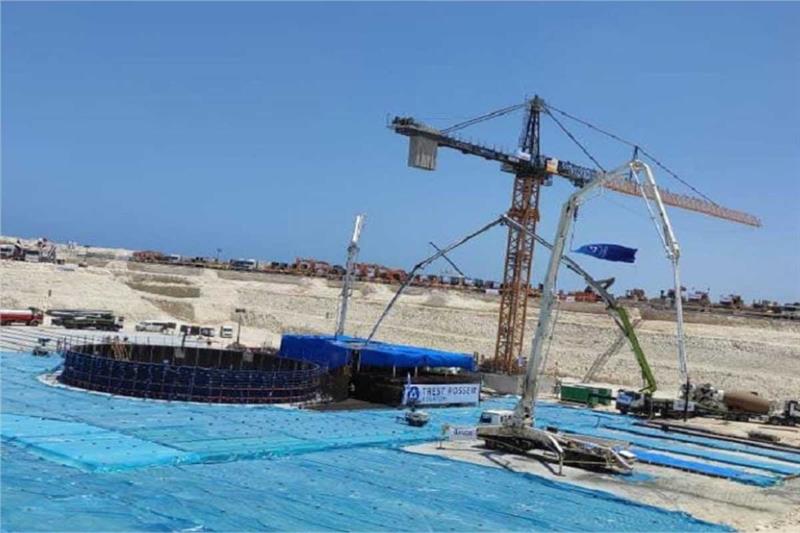The plant is located in the northwestern governorate of Marsa Matrouh.
Minister of Electricity and Renewable Energy Mohamed Shaker and General Director of Russia’s State Atomic Energy Corporation (ROSATOM) Alexei Likhachev attended the ceremony at the plant, giving the green light to start the construction works.
Shaker said that El-Dabaa’s reactors comply with the International Atomic Energy Agency’s (IAEA) safety measurements. They can endure earthquakes and airplane crashes, he noted, adding that the reactor’s operating span may extend to 60 years.
“Building El-Dabaa NPP allows Egypt the chance to achieve a new level of industry and technology. This will be the biggest project between Russia and Egypt since establishing the High Dam project in Aswan. It has been a dream of Egyptians to acquire nuclear energy for more than half a century. ROSATOM is honoured to fulfil it,” the Twitter account of the Russian Embassy in Egypt quoted Likhachev as saying at the ceremony.
The event was attended by Osama Asran, the deputy minister of electricity and renewable energy, CEO of the Egyptian Electricity Holding Company (EEHC) Gaber Desouky, Advisor to the Minister of Electricity Amgad Said, a delegation of senior officials from Russian companies implementing the project, as well as Amgad El-Wakil, the chairman of the NPPA, which organised the event.
El-Wakil told Al-Ahram Arabic news website on Wednesday that El-Dabaa is located on the Mediterranean, 140 kilometres west of Alexandria.
He noted that funding for the project is based on a governmental financial agreement. Loans will be acquired after operating the plant and collecting revenues from electricity generation.
El-Wakil said the project is expected to generate net revenues of $264 billion for the state treasury over 60 years.
In December 2017, President Abdel-Fattah El-Sisi and Russian President Vladimir Putin signed an agreement in Cairo to initiate work on the plant at a construction cost of $28.75 billion.
Russia will finance 85 percent of the cost with a loan of $25 billion, while Egypt will provide the remaining 15 percent in the form of installments. The Russian loan is repaid over 22 years, with an annual interest of three percent.
On 30 June 2022, the Egyptian Nuclear and Radiological Regulatory Authority (ENRRA) permitted ROSATOM to start the construction work on El-Dabaa project, which Egypt and Russia signed an agreement to build in November 2015 to generate a total of 4,800 megawatts via four reactors.
Earlier in June, ROSATOM announced that it started the manufacture in Saint Petersburg of electrical components for the plant’s reactor vessel, according to Sputnik news agency.
ROSATOM had submitted a request to establish the first two reactors out of four reactors in January 2019, and received the permission in June 2021, after safety measures were checked and qualified workers and means of conducting safety tests were available.
El-Dabaa NPP is designed according to the latest 3+ Generation which is fully compliant with all post-Fukushima requirements of the International Atomic Energy Agency.
ROSATOM had previously announced that 40% of the cost of Dabaa nuclear power plant is allocated for safety measures.
The four units of the plant are expected to operate at full capacity of 4,800 megawatts by 2030, with the first reactor operating at a capacity of 1,200 Megawatts at the first phase, said El-Wakil.
According to the project’s design, the nuclear plant will have four VVER-1,200 reactor units, with the first unit scheduled for operation in 2026.
In November 2021, Egypt signed a long-term $1 million agreement with the Czech ÚJV Rež Research and Development company to consult on El-Dabaa Nuclear Plant, according to ENRRA Chairperson Sami Shaaban.
According to the contract, ÚJV Rež will provide technical assistance to the ENRRA in licensing the nuclear plant.
source/content: english.ahram.org.eg (headline edited)
__________

_________
EGYPT